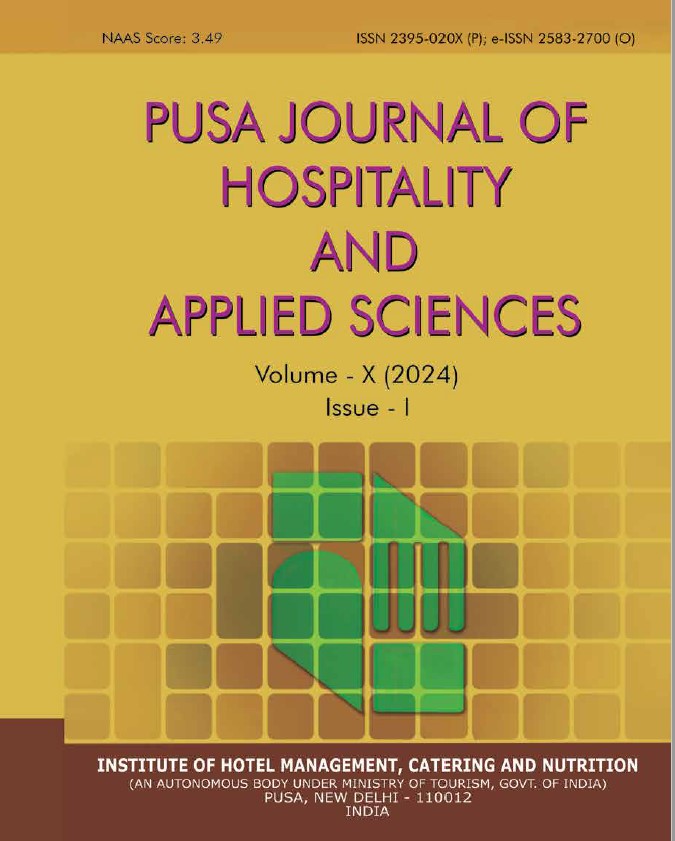A Study On The Effectiveness Of Blog In Learning Process
Keywords:
Information Technology, Learning, BlogAbstract
Background: Information Technology has provided immediacy to education. Ablog-portmanteauof the term web log. A weblog is a Website that consists of a series of entries arranged in reverse chronological order, often updated on frequently with new information about particular topics. The information can be written by the site owner, gleaned from other Websites or other sources, or contributed by users. Blogs can be a place where students reflect on readings, much as analog journaling was used as a pedagogical tool in the past. Objective: This study was designed to identify the effectiveness of blog, as a part of their education experience in the process of learning and interacting with their co-students. Method: In the present study, samples of 100 college students were drawn from Hotel Management discipline. They were administered 20-items of usage of Blog Scale. The collected data were statistically analyzed by using mean, standard deviation and t – test. Results: The study indicated that female and male students have significant effectiveness of BLOG usage in their learning process. Recently, blogs have begun to emerge as a useful type of educational technology. Conclusion : Blogs can be effective educational technology to which will facilitate learning for Gen. Y in this constantly changing scenario.
References
Baggetun, R., &Wasson, B. (2006). Self-regulated learning and open writing. European Journal of Education, 41(3–4), 453–472.
Bartlett-Bragg, A. (2003). Blogging to learn. In Knowledge tree. http://knowledgetree. flexiblelearning.netau/edition04/pdf/Blogging to Learn.pdf
Berge, Z., & Collins, M. (1995). Computer-mediated communication and the online classroom: Overview and perspectives. Cresskill, New Jersey: Hampton Press.
Black, A. (2005). The Use of asynchronous discussion: Creating a text of talk. Contemporary Issues in Technology and Teacher Education, 5(1) 5-24.
Blázquez D, Calvo J. E-Learning experience of the “virtual campus of sport”. International Journal of Computer Science in Sport. 2002; 2(1):31-33.
Demirel, T., Duman, D., Incesu, S., & Goktas, Y. (2008). Using Blogs (Weblogs) in Higher Education: Toys or Tools. Kuzu. A, Odabasi. Paper presented at the International Educational Technology Conference 2008, Eskisehir, Turkey, 1114-1117.
Divitini, M., Haugalokken, O., & Morken, E. M. (2005). Blog to support learning in the field: Lessons learned from a fiasco. Proceedings of the Fifth IEEE International Conference on Advanced Learning Technologies (ICALT’05), 219 – 221.
Downes, S. (2004). Educational blogging. EDUCAUSE Review, 39(5), 14–26. 9. Ellison, N., & Wu, Y. (2008). Blogging in the Classroom: A Preliminary exploration of student attitudes and impact on comprehension. Journal of Educational Multimedia and Hypermedia, 17(1), 99–122.
Halic, O., Lee, D., Paulus, T. & Spence, M. (2010). To blog or not to blog: Students’ perceptions of blog effectiveness for learning in a college-level course. Internet and Higher Education, 13(4), 206-13.
Herring, S. C., Kouper, I., Paolillo, J. C., Scheidt, L. A., Tyworth, M.,Welsch, P., (2005). Conversations in the Blogosphere: An analysis “From the Bottom Up”. In Proceedings of the 38th Hawaii international conference on system sciences – 2005.
Kelly, Kris. (2009.) To blog, or not to blog (in the classroom).
Kerawalla L, Minocha S, Kirkup G, & Conole G. An empirically grounded framework to guide blogging in higher education. Journal of Computer Assisted Learning. 2009; 25:31-42. 14. Nonaka, I., & Takeuchi, H. (1995). The knowledge-creating company: How Japanese companies create the dynamics of innovation. New York: Oxford University Press.
Pacquet, S. (2002, October). Personal knowledge publishing and its uses in research. In Seb’s open research.
Shoffner, M. (2006). We don’t have the liberty of being brainless: Exploring pre-service teachers’ use of Weblogs for informal reflection. Dissertation Abstracts International, (UMI No. 3207340). 17. Wang, S., Hsu, H-Y., & McPherson, S. (2006). Using Blogs to Facilitate Online Discussion. Proceedings of World Conference on E-Learning in Corporate, Government, Healthcare, and Higher Education, 998-1001.
Yang, S. (2009). Using blogs to enhance critical reflection and community of practice. Educational Technology & Society, 12(2), 11–21.




